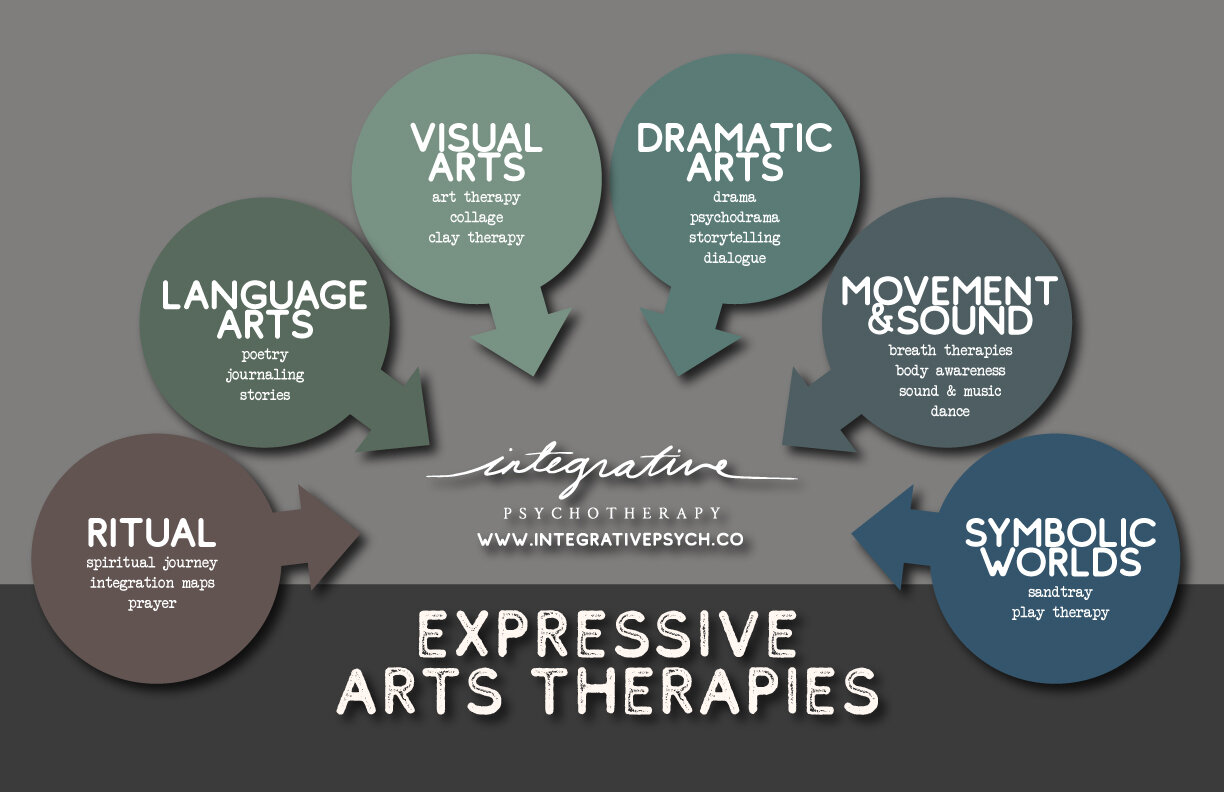What are Expressive Arts Therapy?
Expressive Arts for anxiety and trauma in Long Island, New York
Expressive & Creative Art Therapies help resolve fear and worries without needing to “talk about it”.
Expressive arts therapy is a multimodal approach, combining psychology and the creative process to promote personal growth and healing. It is a therapy approach that is gentle, yet effective especially for those who have not felt relief or success with traditional psychotherapy. The focus in this approach is less focused on the mind making shifts or coming up with answers, but rather, it trusts that by creative expression, the mind and body will find a way to process and resolve some pressing issues.
This approach has helped many clients heal from anxiety, trauma, depression, relationship issues and fears.
Expressive Arts is powered by an inborn desire to create, and utilizes creative expression as a therapeutic tool to help initiate change. The difference between expressive arts therapy and art therapy is that expressive arts therapy draws from a variety of art forms such as writing, psychodrama, dance, movement, painting, drawing, sculpting, play and music (or a combination of them), while art therapy is based on one particular art form.
Based on the assumption that people can heal through self-discovery, creative expression gives therapists an incredible variety of tools to help clients tap into their imagination, body sensations, feelings, emotions, and thought processes in profound ways.
Clients explore their inner world through pictures, sounds, imagery, storytelling, dance, music, drama, poetry, movement, horticulture, and visual arts in an integrated way, to facilitate growth and healing.
By using creative processes, clients are able to push boundaries and remove barriers that can sometimes inhibit progress and healing in traditional talk therapies. Expressive arts acknowledges that each person’s process is unique, and while one individual may be successful with talk therapy, another person may prefer to use journaling, movement, art, or a combination of different experiences during therapy.
Expressive arts therapy is successful because it is not based on artistic outcomes but rather on the process of creating.
A person who utilizes expressive arts therapy is not required to have any artistic ability whatsoever.
Each creative arts modality is unique, and the use of each is carefully considered by each expressive arts therapist. For example, journaling might be an appropriate expressive outlet for someone new to therapy. On the other side of the spectrum, a person who has already established a strong therapeutic relationship with his or her therapist may appreciate the use of movement or drama. Careful use of each modality is determined by the strength, timing, and readiness of the person in therapy. Different modalities may be used at any point throughout the therapeutic process as needed. Homework may also be issued for the person in therapy to complete between sessions.
The therapeutic impact of expressive arts therapy is focused on four major areas:
Expression
Imagination
Active participation
Mind-body connection.
Because creativity stems from a deep emotional place inside, the arts enable an unparalleled self-discovery process and helps to hone the healing of common emotional ailments and inhibitions such as perfectionism, “never enoughness”, black and white thinking, and many shades of fear. Creativity becomes a unique journey to expression of inner feelings, deepest desires and long-lost intuition. In other words, the creative process becomes the pathway to emotional health.
If you are looking to heal some of your perfectionism, a past trauma, anxiety, relationship issues or depression, expressive arts may be a useful route for you in therapy! This approach has been useful for an array of presenting emotional struggles, and has even been helpful for those who are just looking for a supportive place to explore who they are and what goals they would like to focus on in life.
The good news? Your Expressive Arts session doesn’t always need to be about processing something emotionally intense, though it will almost always leaving your feeling more focused and grounded, and you’ll create something fun, light and creative, which is the great part of it all!
Reach out to schedule your first expressive arts session.
We offer telehealth counseling via video platform as well as in-person sessions.
At Integrative Psychotherapy we are trained to help you use expressive therapies to help you heal and move forward with life with more ease.
A note about our fees: our session fee for individual therapy is $250-350, and we provide the paperwork for your insurance company for out of network reimbursement if you have out of network benefits.

